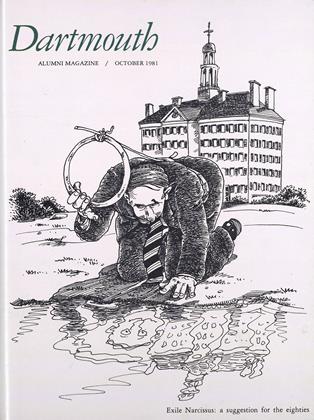Continuing education got a shot in the arm this summer from a new kind of cancer conference hosted by the Dartmouth Hitchcock Medical Center. "It was like going back to medical school for us all," said Herbert Maurer of the Dartmouth faculty, who chaired the three-day conference. "It was an excellent course. Everybody felt strongly that it was the best conference he or she had ever attended," Maurer said of
"Oncology in the Eighties," basing his assessment on the enthusiastic comments of participants and the fact that all of them stayed right up until 5:00 p.m. of the last day.
Oncology (tumor study) conferences are rife in the United States, according to Maurer, who explained that in organizing the August meeting here he and his colleagues departed from the norm: "We decided against competing with the usual multitude of such conferences, which are designed to give people who practice oncology feedback about therapy. We felt it was time to get the newest stuff from the laboratory out to the clinical investigators, to address ourselves to the cutting edge of science."
Twelve cancer experts from across the country and several more from Dartmouth's own ranks addressed some 65 participants, also from all over, on the latest research both successful and unsuccessful in such fields as radiation therapy, clinical oncology, pathology, and pharmacy. Most of the speakers were medical faculty members or members of the National Cancer Institute.
Martin Cline of the University of California at Los Angeles reported on promising research suggesting that replacing diseased genes with healthy genes may help cancer patients. The recent development of monoclonal antibody research was discussed by Samuel Broder of the National Cancer Institute, who spoke of his hope that some day the greater diagnostic precision promised by that research would allow therapy to be tailored to activate a patient's own defenses against cancer. Dartmouth's Leo Zacharski described his success in treating one kind of lung cancer with the anti-coagulant warfarin, the major ingredient in most rat poisons. Evan Douple, also from Dartmouth, described the new twist he has given an old idea, the treatment of cancers with heat. Douple has developed a technique for shrinking tumors by applying the heat through microwave antennas.
Robert Gallo, chief of the tumor biology laboratory at the National Cancer Institute, provided one of the conference highlights by reporting on his success in isolating a virus associated with the rare cancer, T-cell leukemia. Gallo also said, "Most of us still believe there is a common biochemical link in cancer," and he spoke of the hope of finding one basic answer by probing the DNA molecule. On the debit side, Ross Mclntyre, head of the Norris Cotton Cancer Center and Carroll Professor of Oncology at the Dartmouth Medical School, reported that recent hopes pinned on interferon as an effective cancer weapon are being steadily dashed.
As the meetings.began, Maurer, the conference host, had said, "We've had traditional cancer treatments available for some time radiation, chemotherapy, surgery. Now, as a result of a lot of basic research, we've got a whole new range of methods. We've got to start using these treatments. Whole new techniques are here." The conference closed on an equally optimistic note from Mclntyre, who said, "The lot of the average patient with cancer is going to improve through the eighties," a prophecy he qualified somewhat by pointing out that the improvement would require "lots of money and lots of research." Gallo of the National Cancer Institute had the very last word, however, which was a clearcut caveat: "We have a very long way to go. Don't underestimate the nature of the beast."
 View Full Issue
View Full Issue
More From This Issue
-
 Cover Story
Cover StoryJust a suggestion, Mr. President: an agenda for the eighties
October 1981 -
 Feature
FeatureCarlos Fuentes: Of isolation, of connection
October 1981 -
 Feature
FeatureSubmariner
October 1981 By M. B. R -
 Article
ArticleDeaths
October 1981 -
 Article
Article1981 ALUMNI FUND CAMPAIGN
October 1981 -
 Article
ArticleWearers of the Green
October 1981 By Nancy Wasserman '77







